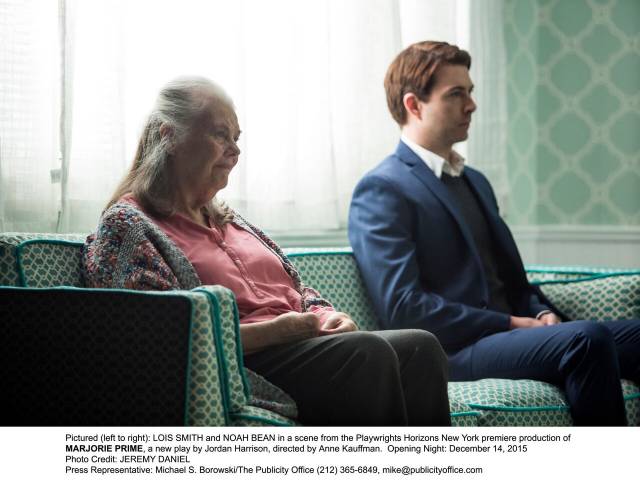
 In Marjorie Prime, a Pulitzer Prize finalist written by Jordan Harrison, pixelated holographic robots called “Primes” help humans navigate and renew their memories, some sweet, some grief-laden. Constructed sparely, with deep rivers of emotion under simple dialogue, Mr. Harrison’s new play, now at Playwrights Horizons, stirs up questions without giving answers; it is the kind of theater that spurs later conversations about artificial intelligence, our mortality, caring for parents and the quality of life. Mr. Harrison also weaves into the story a swath of unresolved grief and an air of mystery to the relationships between an aging mother, Marjorie (Lois Smith), her middle-aged daughter, Tess (Lisa Emery), and her son-in-law, Jon (Stephen Root), which shrouds the plot and makes for a remarkable ending to this 80-minute play.
In Marjorie Prime, a Pulitzer Prize finalist written by Jordan Harrison, pixelated holographic robots called “Primes” help humans navigate and renew their memories, some sweet, some grief-laden. Constructed sparely, with deep rivers of emotion under simple dialogue, Mr. Harrison’s new play, now at Playwrights Horizons, stirs up questions without giving answers; it is the kind of theater that spurs later conversations about artificial intelligence, our mortality, caring for parents and the quality of life. Mr. Harrison also weaves into the story a swath of unresolved grief and an air of mystery to the relationships between an aging mother, Marjorie (Lois Smith), her middle-aged daughter, Tess (Lisa Emery), and her son-in-law, Jon (Stephen Root), which shrouds the plot and makes for a remarkable ending to this 80-minute play.
Lois Smith, two-time Tony Award nominee and a national treasure of the American theater, is funny, touching and sublime as Marjorie. In the first scene, as Marjorie struggles to grasp and piece together memories, Ms. Smith’s face revels in the past; it’s as if we are watching celluloid flipping through an old projector. Interacting with the Prime of her deceased husband Walter, in his much younger days, perfectly played with the right amount of charm and stiffness by Noah Bean, Ms. Smith flirts and cajoles, enjoying this new technology intended to ease the suffering of old age, but she also manages to show us her emptiness and the sorrow in her heart that her mind has forgot. Ms. Emery’s performance as the high-strung, 'stay in control and keep moving' Tess is haunting. Filled with an ever growing grief, Ms. Emery physically inhabits her character, from slumped shoulders and concave chest to fidgety hands and deer-in-headlights staring. She crawls inside of Tess emotionally: we witness her depression, her search for her mother’s love and the tortured impact of a childhood tragedy. As each Prime makes efforts to collect information, in order to offer better service, it is only Tess’s husband, Jon, who manages to wrestle with his grief. Understated and brilliant, Mr. Root’s Jon is heartbreaking, human and hopeful. Mr. Root shows us how in the midst of pain, love can be celebrated.
Pulling us into the future, scenic designer Laura Jellinek washes the set in patterned shades of calm green plus a sleek modern kitchen. Anne Kauffman, an Obie Award-winning director who is unafraid of silence on stage, has directed with a deep thoughtfulness, shaping exquisite moments and then letting them resonant beyond the stage and into our hearts.